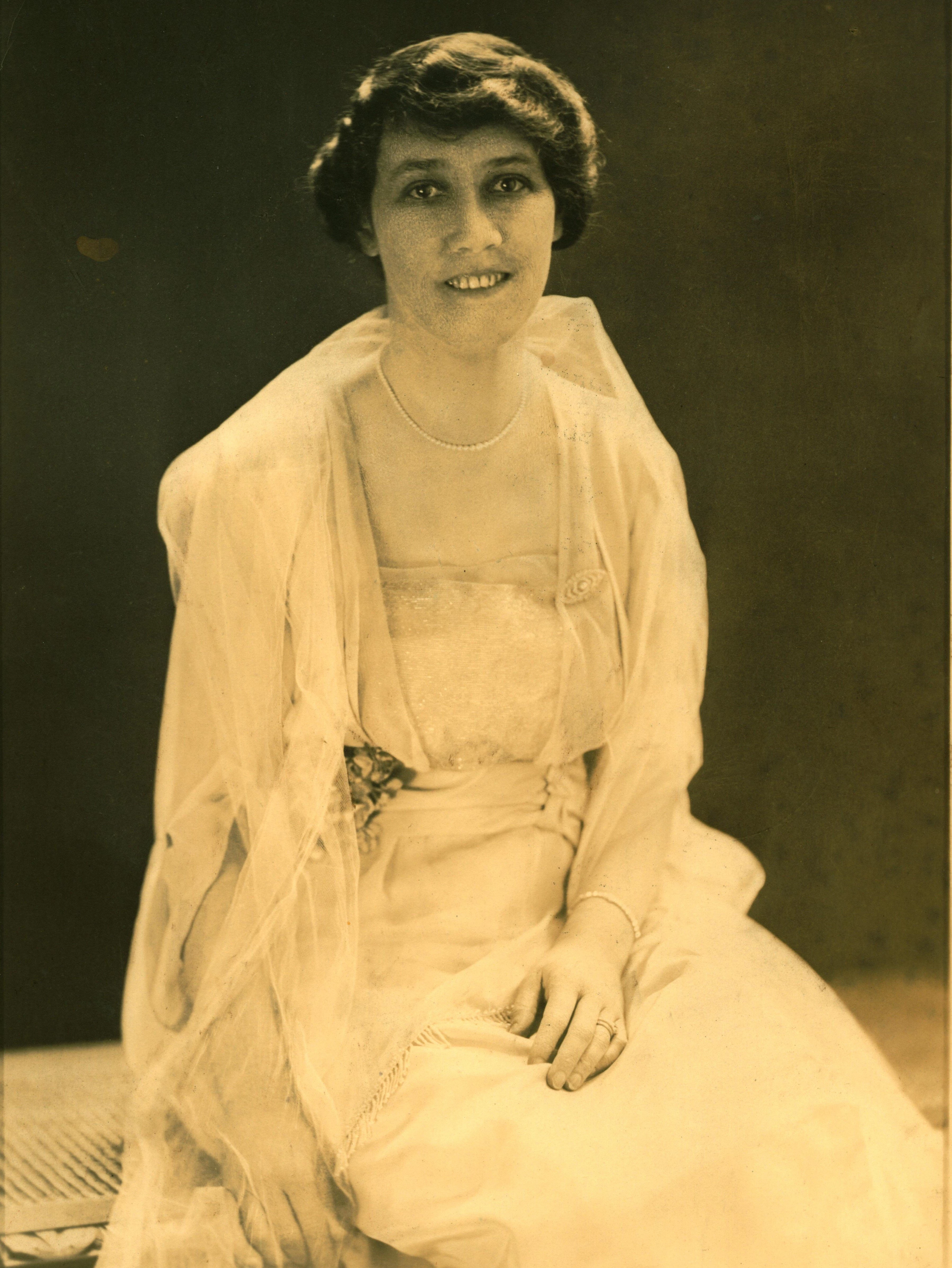Ewing, Hazle Buck
World traveler, pioneering activist, environmentalist, and philanthropist, Hazle Buck Ewing was born on December 25, 1880 to Orlando John and Lillian (Brewer) Buck. Her father was a partner of William Wrigley Jr. (gifted salesman, industrialist, and pioneer in the chewing gum industry) where he made his fortune. Raised in the Auburn Park neighborhood near Chicago, Hazle attended the University of Chicago graduating in 1902 with a degree in Philosophy. While at the university, she played on the women’s basketball team and enjoyed playing golf. Hazle remained athletic for the remainder of her life, including playing tennis on the court in the backyard of her Bloomington home and being an avid horseback rider.
On October 22, 1907, in her parents living room in Evanston, Illinois, Hazle married Davis Ewing, the son of James Stevenson Ewing, ambassador to Belgium during Grover Cleveland’s second term as President of the United States (1893-1897). Davis brought Hazle back to his home in Bloomington. He started a concrete company in 1899 laying some of the first concrete streets and sidewalks in Central Illinois.
During the early years of their life together, the Ewing’s adopted one son Ralph and raised another, Nelson (who from Victory Hall home for boys), as their own. Hazle embraced her new community, becoming active in local, state, national and international causes.
Joining the Woman’s Suffrage Movement in 1915, Hazle worked to secure voting rights for women through her writing, attending conferences, and providing financial support to the movement. She continued to promote women’s rights long after the passage of the 19th Amendment to the U.S. Constitution (which granted women the right to vote) until her health later in life prevented her from leaving her home.
While supporting the right for women to vote, Hazle started a campaign to raise funds to start an orphanage for boys in Bloomington, Normal. Since the mid-1800s, Bloomington was home to the Girl’s Industrial Home (which was a place for dependent children who were neglected or had no one to care for them). Orphaned boys were sometimes allowed to stay at the home if the need was great enough, and space allowed. But after World War I, the Home was unable to accommodate the growing influx of boys. Knowing Hazle was civic-minded, Lucy Orme Morgan, the president of the Home, contacted Hazle and two other friends, hoping they would “undertake the organization of a home for dependent boys similar to the one for girls.” Hazle rose to the occasion, and with the assistance of friends, raised money for a down payment of a large home at 904 Hovey Ave in Normal, and eventually paid off the property. The home became known as Victory Hall, named in honor of the end of World War I. It was the hope that “in the case of each boy who came [to the home] there would be a victory in helping him become a valuable citizen in whatever community he made his permanent home.”
Hazle had several other causes she supported, many of them growing out of a world tour she took with her husband and seventeen-year-old son Ralph from 1924-1925. She stated “…if every world citizen could take the same kind of trip we had taken, there would be no more war. Nobody believed that war really settled anything.” Thus began Hazle’s lifetime goal of achieving world peace and fostering a greater understanding of diverse cultures. She established the School of Nations at Principia College in Elsah, Illinois for the development of International Studies providing scholarships for international exchange students, teachers, and visiting lecturers. Due to Hazle’s contributions, the college continues to provide scholarships and international programming today.
A local philanthropist, Hazle supported causes that benefited the welfare of women, animals, and the conservation of prairie lands. In 1960, the stone arch bridge at Miller Park had partially collapsed. Due to the City of Bloomington’s sever penny-pinching ways, the bridge remained an unfixed eyesore for six years until Hazle stepped forward and donated $6,000 (or approximately $57,000 in 2022) for the much-needed bridge repairs. In 1967, she established an endowment through the Miller Park Zoological Society (the Ewing Zoo Foundation) with the purpose of buying animals for Miller Park Zoo. She made an initial donation of $25,000 (or an estimated $219,000 in 2022). Hazle also donated $17,650 (or $168,000 in 2022) for improvements to Ewing Parks I and II (new parks that were carved out of the Ewing estate and gifted to the City of Bloomington). Her generous donations also helped start the School of Nursing at Illinois Wesleyan University. Upon her death on August 29, 1969, she left 160 acres of land to the State of Illinois to help conserve prairie lands. These are only a few of the many contributions she made to educational and social causes. Upon her death the Pantagraph commented “keen understanding of the responsibilities and opportunities wealth brings… Bloomington and Normal are better places for her being here. Mrs. Ewing dedicated much of her effort to that end.”
One of Hazle Buck Ewing’s greatest gifts was leaving her home, Sunset Hill, to the Illinois State University Foundation used as a cultural center for the University and the community. Business retreats, the Illinois Shakespeare Festival, weddings, and seasonal events are only a few of the activities that take place on the grounds and in the Genevieve Green Gardens. ,
Using her prosperity, she lived her life giving to others who were less fortunate or unable to fight for themselves. This is the legacy of Hazle Buck Ewing.

